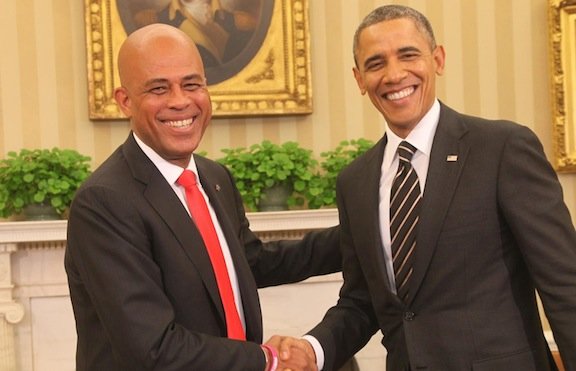In 2008, Barack Obama made history by becoming the first African American President of the United States. His election was hailed as a milestone in the struggle for racial equality and justice. Yet, despite his commitment to addressing the concerns of the Black community, Obama’s presidency was marked by a glaring omission: he never visited Haiti, the first independent Black nation in the world.
This failure to visit Haiti is a stark example of hypocrisy. Obama’s presidency was built on the promise of change and hope, yet he failed to extend this promise to the Haitian people. Haiti, a country that has faced centuries of oppression, poverty, and natural disasters, deserved more from the first Black President of the United States.
Moreover, Obama’s failure to visit Haiti is particularly striking given his efforts to court the Black vote in the US. Every four years, politicians make a concerted effort to win over Black voters, but Obama’s failure to visit Haiti suggests that this effort was superficial or transactional, rather than a genuine commitment to addressing the concerns and needs of the Black community.
Furthermore, the mismanagement of international funds after the devastating earthquake in 2010 is a stark reminder of the neglect and hypocrisy that has characterized the international community’s response to Haiti’s needs. Billions of dollars were pledged to help Haiti rebuild, but much of that money was squandered on ineffective projects, bureaucratic red tape, and even lined the pockets of corrupt officials. This mismanagement occurred under Obama’s administration, with Hillary Clinton as Secretary of State, who was responsible for overseeing the US response to the earthquake.
And now, as election season approaches, the Democratic Party has the audacity to put Obama back on stage, asking Haitian Americans to vote for them. This is a slap in the face to the Haitian community, who were ignored and neglected during Obama’s presidency. It is time to hold them accountable for their actions and demand more from those who claim to represent us.
We must open our eyes to the hypocrisy of politicians who court our votes but fail to deliver on their promises. We must demand more from those who claim to represent us and hold them accountable for their actions. The Haitian community deserves better, and it is time for us to demand it. The Haitian proverb “Bay kou pliye, pote mak songe” holds profound significance in understanding the impact of the Democratic Party’s neglect and nonchalance towards Haiti. Translating to “Give a blow, get a scar, carry the mark,” this proverb highlights the long-lasting consequences of actions, or in this case, inactions.
The Haitian people have been “scarred” by the Democratic Party’s broken promises and lack of support, particularly during times of crisis like the 2010 earthquake. The party’s neglect has led to a deep-seated mistrust and disillusionment among Haitians, who feel abandoned when they needed help the most.
The complexity of political relationships and power dynamics has contributed to this neglect, allowing the Democratic Party to prioritize other interests over Haiti’s needs. However, this proverb reminds us that the consequences of such actions will not soon be forgotten.
Healing the “scar” of neglect will require a genuine commitment from the Democratic Party to rebuild trust and support the Haitian people. This involves accountability, transparency, and follow-through on promises made. Only then can the party begin to repair the damage and work towards a more equitable relationship with Haiti.
As the proverb suggests, the impact of neglect can be long-lasting, but it is not irreversible. With effort and dedication, the Democratic Party can work to heal the “scar” and build a stronger, more supportive relationship with the Haitian people.
In conclusion, the Democratic Party’s neglect and nonchalance towards Haiti, exemplified by Obama’s failure to visit the country during his presidency, have had far-reaching consequences. The Haitian proverb “Bay kou pliye, pote mak songe” reminds us that the impact of neglect can be long-lasting, leaving deep scars that will not soon be forgotten. However, it is not irreversible. By acknowledging past mistakes, taking responsibility for their actions, and making a genuine commitment to rebuild trust and support the Haitian people, the Democratic Party can begin to heal the “scar” of neglect. It is time for the party to move beyond superficial promises and transactional politics, and instead, work towards a more equitable relationship with Haiti. The Haitian community deserves better, and it is time for us to demand it. Only through accountability, transparency, and follow-through on promises made can we build a stronger, more supportive relationship between the Democratic Party and the Haitian people. The time for change is now; let us unite to demand justice and equity for Haiti, and hold accountable those who claim to represent us.
References:
André, R. (2016, March 18). Why Didn’t Obama Visit Haiti? The Haitian Times.
CNN. (2017). Obama’s Overseas Travels. Retrieved from (link unavailable)
Elliott, J. (2015, December 18). Haiti Earthquake Relief: Where Did the Money Go? ProPublica.
Sontag, D. (2015, December 24). Billions in Aid for Haiti, But What About the People? The New York Times.
Vogel, K. P. (2015, September 22). Clinton’s Haiti Aid Efforts Under Fire. Politico.
Doucet, I. (2015, October 28). Hillary Clinton’s Haiti Problem. The Nation.
Doucet, I. (2016, November 2). The Democratic Party’s Haiti Problem. The Nation.
André, R. (2016, November 4). Haiti and the US Presidential Election. The Haitian Times.




